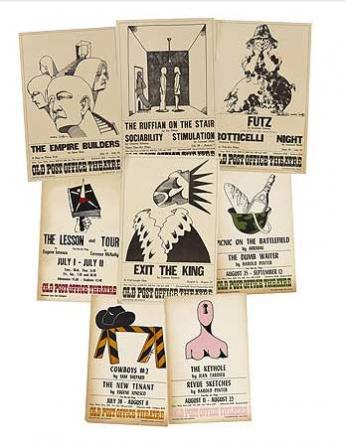Antiquarian Booksellers' Association of America Lighthouse Books, ABAA
Collecting - Eugene Ionesco

By Michael Slicker
The Romanian-French playwright Eugene Ionesco was one of the leading absurdist writers of the 20th century. Among his best known plays are The Bald Soprano (1950), The Lesson (1951), The Chairs (1952), Jack or The Submission (1955), The Killer (1958), Rhinoceros (1959), Exit the King (1962), A Stroll in the Air (1963), and Macbett (1972).
Ionesco was born in Romania but grew up in France, and though he moved back to Romania for a period and attended the University of Bucharest, he eventually moved back to France and remained there during World War II, settling in Paris in 1944.
At the age of 40, he decided to learn English. He copied sentences from an English text book with the idea of memorizing them. But soon he found himself carefully reading the sentences and absorbing the meaning. He discovered amazing truths: The floor was down, ceiling was up. The week had seven days. Though he already knew these things, they suddenly took on new meaning.
The text became more complex. Two characters, Mr. and Mrs. Smith, had a complete back story. They lived near London, had several children and a servant who was also English. Mr. Smith was a clerk. Mrs. Smith was methodical in her quest for truth. Apparently this amazing text had a profound effect on Ionesco.
"A strange phenomenon took place," he wrote later. "I don't know how - the text began imperceptibly to change before my eyes. The very simple, luminously clear statements I had copied so diligently into my notebook, left to themselves, fermented for a while, lost their original identity, expanded and overflowed. The clichés and truisms of the conversation primer, which had once made sense gave way to pseudo-clichés and pseudo-truisms; these disintegrated into wild caricature and parody, and in the end language disintegrated into disjointed fragments of words."
Ionesco translated the experience into his first play, The Bald Soprano, which opened in Paris in 1950 and was roundly ignored until drama critic Jaques Lemarchand and writers Raymond Queneau and Jean Anouilh saw it and began to champion it. Ionesco wrote more than 20 plays in which he rejected the conventions of traditional drama such as character development and plot. His anarchic comedy portrays the meaningless of existence in the modern world.
***
Posted on the Lighthouse Books Blog, presented here by permission of the author. Picture: courtesy of Between the Covers
